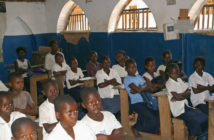As Nigeria’s February 14 elections loom over the horizon with the international arena watching closely, reports emerged on February 2 of yet another attack in northern Nigeria in the city of Gombe, taking place just minutes after President Goodluck Jonathan had left a campaign rally in the area. The bomb was detonated by a female suicide bomber and killed 1 and injured another 18. While it may not have been one of Boko Haram’s largest attacks in Nigeria, its symbolic value and the continued use of female suicide bombers to carry out the group’s deadly initiatives have become growing issues of concern.
Before 2014, the jihadist insurgency Boko Haram, whose name roughly translates to “Western education is sinful” and who have the stated goal of establishing a caliphate in Nigeria, predominately used male fighters to attacks towns, schools and military strongholds. However, in June 2014 the first female suicide bomber rode into a military barracks on a motorcycle and detonated her bomb, killing one soldier.
A long hot summer
Throughout that July, Nigeria saw the emergence of Boko Haram’s new terror strategy, as the northern town of Kano was the target of several suicide attacks all of which involved female teenage suicide bombers. In a sign that the group had become increasingly ruthless, newspapers revealed in 2014 the testimony of an unknown source claiming that 75 of the approximately 180 girls trained by Boko Haram as suicide bombers had been already deployed and were ready to act on orders. Furthermore, later in July three women were arrested and accused of secretly working as recruitment agents for Boko Haram, “luring ladies, especially widows and young girls, by enticing them with male suitors who are mainly members of their terror group, for marriage” said the director of defence information for Nigeria’s Defence Ministry.
The use of young girls is certainly a new and gruesome tactic of Boko Haram, who have realized the strategic value of women and their ability to slip by security checks unnoticed and to infiltrate populated areas with relative ease. Although some have been quick to associate these attacks to the kidnapping of over 200 schoolgirls in Chibok earlier in 2014, raising fears that the organization had brainwashed the girls and was using them for their operations, so far there has been no proof to validate these claims. It is likely that the female suicide bombers have been family members or the children of Boko Haram members.
While one can also argue that this new tactic of using female suicide bombers to launch attacks indicates the group’s weakness and desperation in the face of falling recruitment, the success of their operations over the past year proves otherwise. Boko Haram is a relatively new insurgency and its brutal kidnappings of both young men and women ensure they are equipped for the fight. Through the practice of forced recruitment, the group has succeeded in taking hold of over 25 towns in northeastern states of Yobe, Adamawa and Borno, killing over 6,000 in 2014 and displacing hundreds and thousands.
Rather than a sign of weakness, Boko Haram’s recruitment of women and female suicide bombers is more likely a sign of their new strategy of diversion and propaganda. In it’s final aim to establish a caliphate, the insurgency has used women to attack towns outside of their initial power base, in order to “distract attention and military resources away from the north-east”. Furthermore, female suicide bombers often attract a disproportionate amount of media coverage, placing the group in the international limelight and providing key opportunities for propaganda.
An even hotter winter
The presidential elections this month will likely be a deciding factor for the fate of Nigeria and the continent’s overall security. The race will be the closest fought since the re-establishment of democracy in the country in 1999 and will see the two frontrunners, incumbent President Goodluck Jonathan and ex-military strongman Muhammadu Buhari, go head to head for a second time. Even though Boko Haram has been active since 2009, the recent change of tactics has left Nigerians shell-shocked, leaving Jonathan as the subject of much criticism over his perceived failure to put a stop to the insurgency. In light of these events, the economic successes of Jonathan’s government, from revamping the railroad industry to agricultural reforms, have largely gone unnoticed.
Buhari, who previously ruled the country for a little over a year following a military coup in 1983, was himself displaced for governing over “one of the country’s least popular and repressive regimes with a string of human rights abuses and a shutdown of press freedoms”. Today the 72-year-old general is trying to convince ordinary Nigerians of his ability to wipe out corruption and fight Boko Haram – an appealing stance for Nigerians clamouring for change. However, Buhari’s strong position on imposing Sharia law on a secular Nigeria, his previous instigations to mass violence following Nigeria’s last elections, and his current lack of policy for Nigeria’s economy, all point to the fact that his platform might be nothing more than a damp squib.
As Boko Haram appears to be getting stronger and more ambitious ahead of the elections, intending to disrupt a democratic process it is fundamentally opposed to, it will be up to the future leaders of the country to carve a new security strategy for Nigeria. Nigeria must stand united in the face of terrorism and choose a leader not only capable of crushing the insurgency and providing security for its population, but also one who would be able to promote the strong democratic values and economic prosperity that the country has long been waiting for.




